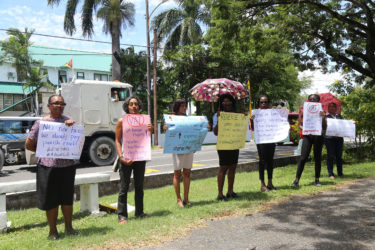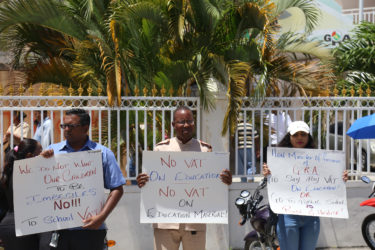Two separately organized protests in front of the Ministry of Finance (MoF) and the Guyana Revenue Authority (GRA) yesterday saw protestors questioning the concept of the “good life” that has continuously been promised by the Government of Guyana in light of recent Value-Added Tax (VAT) measures.
“I think the range of new taxes that the government has introduced over the last two years are extremely burdensome for the majority of the population and I think they need to rethink, they need to review the impact of these policies on working class people and even middle class people and see whether this really fulfills campaign promises, manifesto promises, promises of the good life, because certainly from my perspective the burdens are heavier and they need to reassess,” protestor Melissa Ifill commented during the protest in front of the ministry.
The demonstrations, which occurred simultaneously, started midday yesterday and lasted one hour. The group that met in front of the MoF was led by NGO Red Thread, while businessman Roshan Khan was responsible for mobilizing the group that congregated in front of the GRA.

Marcus called for the reversal of the institution of the 14% VAT on water and electricity, as was rumoured would be done for education. The woman stated that the burden of these taxes is felt mostly by the small man, the single parents and the pensioners. She related that shops have already started to raise their price, the excuse being that they need to cushion the additional costs they incur from the tax implementations.
“So when these things happen it’s the poor man or the poor woman and their family who are feeling the squeeze. And we would like these people to know that you need to think about your economy from the household and not from a national level,” Marcus stated.
There was no one issue for which the protesters had gathered. Filmmaker Kojo McPherson, being father to two children, expressed deep concern at the notion of taxing private education, while stating that parents oftentimes would sacrifice to get the best for their children.
McPherson opined that if the government’s position is that public school is available as an alternative to the private system, there is need for investment in the public school system so that students can actually be absorbed and their needs effectively catered to.
“It’s not easy to send your children to private school but this is something we do for our children and to be punished for that, it doesn’t make sense. I think the ministers’ comments were just callous and that’s the reason I’m out here,” McPherson said.

Khan, who had alluded to the taxes proposed in the sectors of private education and healthcare, had shared similar sentiments during his protest, calling the situation of the tax additions “unfortunate,” “depressing,” and “demoralizing,” and alluded to the possibility of brain drain as a result of the move to tax private education.
“People make sacrifices. I know employees can’t go and join lines for a day, 12 hours, 24 hours to get medical attention. I know people want some good education for their children so they sacrifice tremendously of all the important necessities of life in order to give their children an education and to have the compunction and to my opinion, the moral immaturity to impose VAT on this is very unfortunate and very depressing,” Khan said. He had also stated that the taxes were imposed on the populace without consultation or education.
Private education became subject to VAT on February 1, following the removal of zero-rated items, a measure of the 2017 Budget. An online petition started by the Sixth Form students of the School of the Nation’s Sixth Form College for the removal of the 14% VAT on private education, which got 14,000 signatures, was distributed to various government ministries last Friday.




